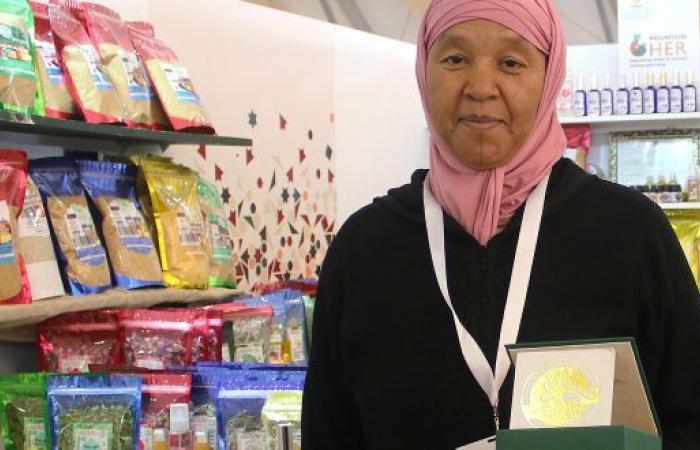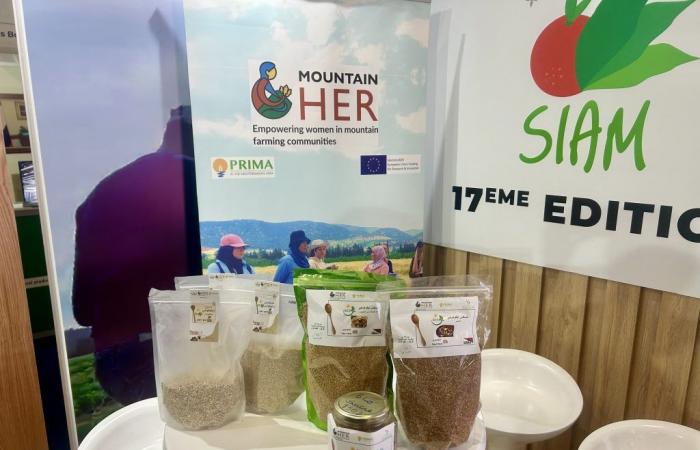On the occasion of the 17th edition of the International Agricultural Fair in Morocco (SIAM), INRA, OXFAM in Morocco and ICARDA organized, within the framework of the Mountainher project, an event around agroecology, a solution for the future in the face of climatic and food challenges. This workshop made it possible to present the results of three years of research and intervention alongside farmers and farmers and key players in the sector.
Agroecology, by promoting agricultural practices respectful of the environment and centered on humans, as carried by foundation II of the national generation Green plan, stands out as a promising path for sustainable agriculture. It also contributes to the emergence of a new agricultural middle class, actively involving women and young people in the transformation of food systems.
Three years of field experimentation
Funded by the Prima Foundation and the European Union, the Mountainher project aims to promote agroecological transformation in mountain agricultural areas, while strengthening the role of women’s cooperatives as a engine of local development. Led by INRA, in partnership with Icarda, Oxfam in Morocco, and other international partners, the project worked with more than 300 farmers – including a majority of women – in six countries of the Mediterranean basin. Its objective being to demonstrate the impact of agroecological practices on
yields of mountain cereal crops, including durum wheat and barley; and the importance for the development of rural communities to involve women and young people.
In Morocco, the project focused on the Azrou-Boulemane-Sefrou region, a mountainous area confronted with the effects of climate change: drop in yields, exhaustion of water resources, decrease in cultivated land. The experts of the project supported farmers and farmers in the adoption of techniques such as direct sowing (without plowing), the rationalization of chemical fertilizers, the more strategic adoption of organic fertilizers, and the introduction of cereal varieties adapted to local conditions.
Concrete results
The data collected is encouraging. The association of new adapted varieties, from ancestral seeds, with agroecological practices made it possible to increase on average by 11 % the yields in durum wheat and barley. The Moroccan variety Faraj offered the best performance, reaching record harvests of 50 quintals per hectare in ten farms in Morocco. This improvement resulted in a direct gain of more than 3,000 dirhams per hectare to the resale of crops, sometimes doubling the income of farmers and farmers. And when these cereals are transformed by female cooperatives into traditional products such as couscous, gross income can exceed 30,000 dirhams per hectare.
-
Towards inclusive and durable value chains
One of the main successes of the project lies in the development of local short circuits connecting farmers and farmers to women’s cooperatives. This model promotes local promotion of products, cost reduction and increased income, while improving the socioeconomic tissues of communities.
However, rural cooperatives are often faced with governance challenges. Few have clear statutes allowing them to effectively organize decision -making or the distribution of responsibilities. Mountainher also worked to structure this governance by offering models of standard statutes, inspired by exchanges between the six participating countries. These tools promote shared governance, financial transparency and equitable participation of members.
Capacity building and market access
Beyond agricultural practices, the project also emphasized the strengthening of the skills of the members of the cooperatives. Training in agrifood transformation, financial education and management were led by INRA, ICARDA and OXFAM experts. Support has also been provided for market access: professional photo sessions, training in the mastery of digital platforms, connecting with restaurants and grocery stores.
Finally, in accordance with law n ° 47.06, texts 87 and 88 of 2007, and the general tax code, the project encouraged the expansion of memberships to cooperatives to also include farmers and farmers, becoming cooperatives which transform gross grains produced by their members, and thus allowing them to benefit from tax exemptions (professional tax and taxes communal), a significant lever for increasing their turnover.
A “farm to the fork” initiative
Mountainher has adopted a global approach to the value chain, combining agroecological transition, social inclusion, generation of income, and respect for the environment. This is illustrated by supporting the Al Amal d’Azrou female cooperative, in the creation of a traditional recipe book, highlighting their products: different variants of couscous, Zammita, Belboula or Berkoukes. This book will soon be available on the Moroccan market. Mountainher is thus an innovative model of agricultural development in mountain areas, placing women at the heart of economic, social and environmental dynamics









